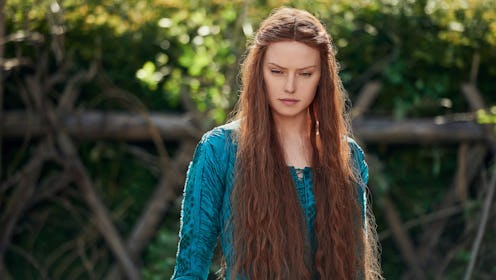Entertainment
Daisy Ridley's New Movie Is The Feminist Shakespeare Fan Fiction Of Your Dreams

If you're a woman and you've taken a high school English class, you may remember that in Hamlet, the love interest of the titular hero gets an ending that she hardly deserves. Ophelia, even in her best iterations, is still a woman trapped in the bravado-laden man's world of William Shakespeare's Denmark. She's doomed to drown herself after being driven mad by her one-time paramour Hamlet, her father Polonius, and everything else wrapped up in the play's poisonous pissing contest between the murderous Uncle-King Claudius and his vengeful Nephew-Prince Hamlet. But in Daisy Ridley's new movie Ophelia (director: Claire McCarthy) it's the end of the world of Hamlet as we know it.
In case you've forgotten, the original Hamlet basically goes like this: Hamlet's uncle Claudius kills Hamlet's father, marries Hamlet's mother, and becomes King. Hamlet goes mad trying to out Claudius as a murderer — one side effect of which is killing his love interest Ophelia's father, driving her mad, and then weeping over her grave after she drowns herself. Oh, and after that, nearly everyone else in the play dies in a big, monologue-laden demonstration of the dangers of toxic masculinity.
Ophelia the film, which doesn't yet have distribution outside of festivals (stay tuned, though), takes a slightly different approach. It makes Ophelia the narrator, taking the audience through the corridors and backstory of Hamlet's most famous plots — careful to never quote the iconic Shakespeare lines exactly, but giving just enough to know where the parallel realities start to cross. Where Hamlet's mother Gertrude (Naomi Watts) is painted as an unfaithful, opportunistic traitor at almost every turn in the original play, Ophelia sees a more vulnerable, sympathetic side of the queen — as well as the cracks in Gertrude's relationship with Hamlet's father that may have led her into Claudius' (Clive Owen) arms.
Where the original Ophelia is the poor pawn, rendered helpless by Hamlet's fickleness and temper, in the film we see that Shakespeare's rendering might have missed the clever, cunning young woman whose wisdom and defiance was washed away in the background of Hamlet's story. And when it comes to Ophelia's most famous moment — her display of apparent madness which precedes her ending her own life — the film renders the that memorable "death" a myth, with the entire plot taking twists and turns in hopes of offering Ophelia a less tragic, finite ending.
The result is a film that feels like a fantastical frolic through the possibilities of what this character's life could have been outside of the containment of her mere 58 speaking lines. (The play contains just shy of 4,000 lines, by the way.) In the play, she's defined only by her relationship to Hamlet, her brother, and her father. In this fan fiction come to life, she's opinionated, strong-willed, and for most of the film, satisfyingly resistant to Hamlet's bratty, entitled flirtations.
Of course, the movie is not perfect. It debuted at the 2018 Sundance Film Festival to some mild reviews and a few more scathing ones. And sure, Ophelia is based on the novel of the same name — a book that wasn't exactly lauded for being the most high-brow re-rendering of a Shakespeare classic. The plot seems more concerned with being a Shakespearean companion piece to Drew Barrymore's Ever After (an early 2000s retelling of Cinderella) or perfect matinee fodder for anyone who loved the Taming of The Shrew-inspired 1999 teen classic 10 Things I Hate About You, than it is with being a hard-nosed feminist criticism of the original text.
But, here's the thing: Not every feminist twist on a classic needs to be laden with detailed, pointed criticism. Sometimes — as is often the case in the world of fan fiction — a story can just be a deliciously satisfying, delightful game of "what if." And that's exactly what Ophelia is.